There is something deeply satisfying about prolonged outdoor physical exercise when your body is injury-free and working well, when your muscles, tendons, and bones have overcome their initial protest at being asked to do the unaccustomed work and become conditioned to it. Long-distance cyclists and marathon runners know this, and as a former enthusiast of both of those pursuits, I, too, know it. However, for me, long-distance rowing delivers the most gratifying way to experience that ineffable feeling that comes from spending days and weeks at a time in the natural world moving under my own power. Thinking back over the various small-boat journeys I’ve made through the years, there is one day in my memory that epitomizes that feeling of fulfillment. It came aboard FIRE-DRAKE, my 18′ sail-and-oar boat, 10 days into a cruise south from Prince Rupert along British Columbia’s Inside Passage.Early in the morning, under the last remnants of the overnight rain and with the roar of Butedale Falls receding beyond my boat’s transom, I rowed away from a ramshackle float at the abandoned settlement of Butedale. It was just another day of cruising in Princess Royal Channel, the steep-sided narrow trench between Princess Royal Island and the mainland, where the outer-coast weather forecasts only loosely corresponded to the actual weather in the passage. The previous day’s sailing wind had given way to calm in the morning, but I was grateful it was not a headwind. Although the flood tide was making against me as I rounded Redcliff Point and turned south along Graham Reach, I knew that I could make progress if I worked close to shore in the back eddies created by the small points and indentations resulting from the folds of the mountains where their feet met the sea. Alex Zimmerman was on a 300-mile cruise, with his friend Tim Yeadon in July 2016 when they called in to Pender Harbor on the east side of British Columbia’s Strait of Georgia. Before his AFib diagnosis, Alex thought nothing of long-distance rowing cruises, whether in company or alone, and relished the challenge of a multiple-day expedition under oar and sail.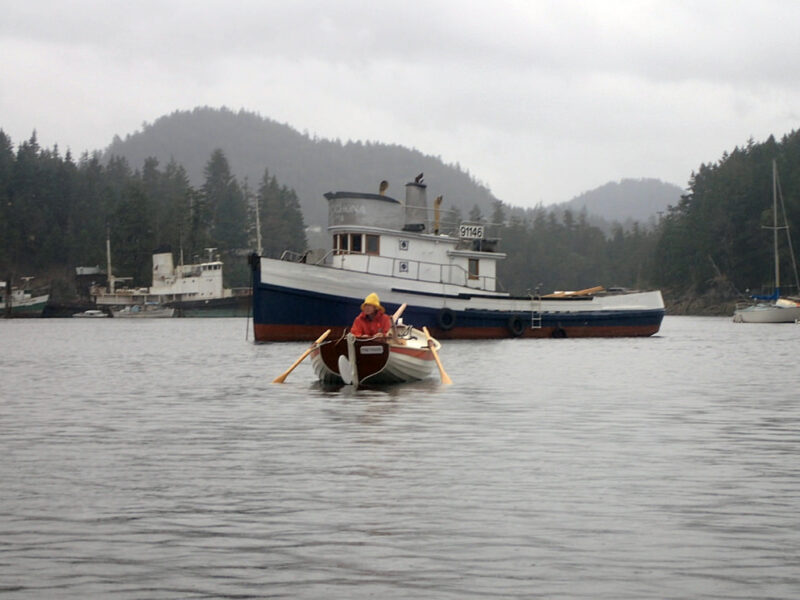 Tim Yeadon
Tim Yeadon
Join The Conversation
We welcome your comments about this article. To include a photo with your remarks, click Choose File below the Comment box.
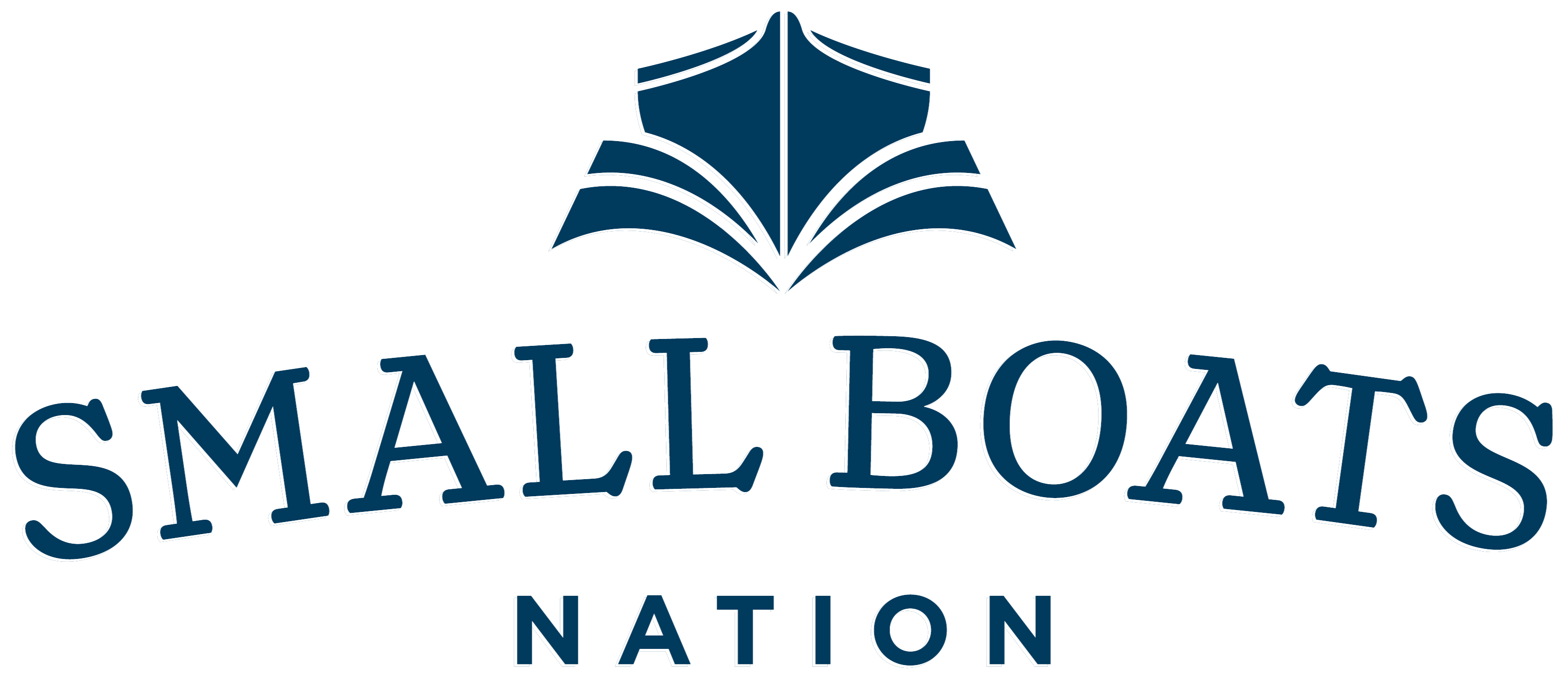
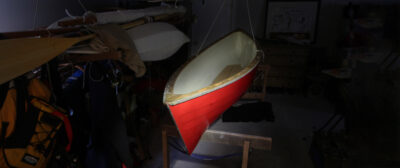
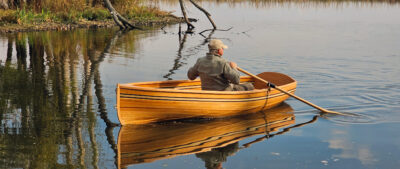
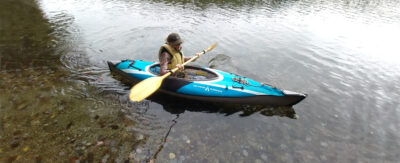
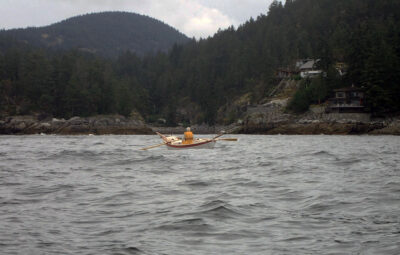
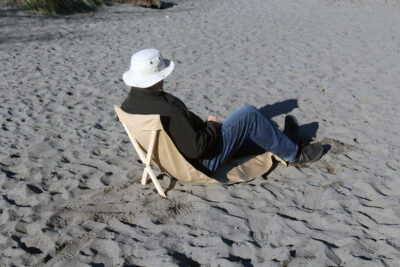
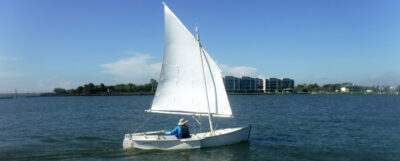
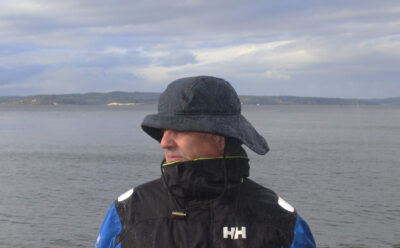
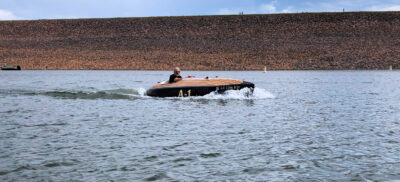
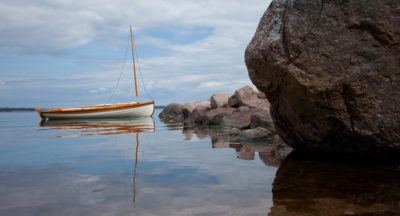
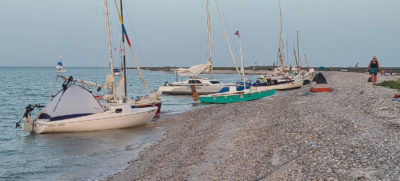
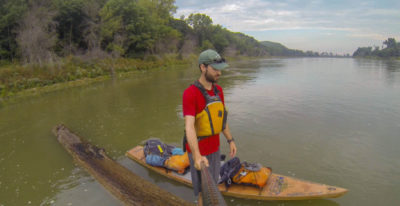
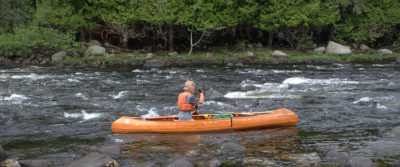
Excellent article.
My hope is that Mr. Zimmerman is able to enjoy many more solo voyages. As for his writing, I very much enjoyed his writing style and personal and engaging approach. I hope to read more from him in Small Boat Nation.
Best regards,
Sandy Ross
North Vancouver, B.C.
Thanks for the kind words, Sandy.
I’ll write something more for SBN when next I have something worthwhile to say.
I had A Fib for years, going in and getting a cardioversion (or shocked back into regular rhythm at the hospital. At age 75 I had an ablation which has resolved the problem. I am now over 80 and no more A Fib.
James, I’m due for an ablation, too. Just waiting for my name to come to the top of the list. I’m told the procedure has a first-time probability of success of 60-80%. I just hope I’m at the upper end of that probability curve!
Not exactly the quality of adventure Alex is used to, but the Salish 100 cruise sponsored by the NW Maritime Center is an excellent 100 mile multiday cruise in the company of like spirits and never out of reach of modern medical facilities.
Worth considering, for sure, although being from out of country I’m not sure how much I want to rely on travel medical insurance, should I actually need it, when I have a “pre-existing condition.”
Thanks, Alex for another outstanding article and your willingness to discuss your health issues and the concerns, frustrations, and emotional dissidence that accompanies such things. Your adventures always make great reading and lest I forget, your CAMUS MOON is outstanding as well. Nice work!
Steven
I appreciate your sharing your latest challenges in your adventures.
It is a reminder to those of us working towards our retirement to enjoy each day we are healthy because there are no guarantees. Health will not wait for our freedom to begin.
As a 74 year old still practicing Emergency Medicine physician, oarsman, marathoner, and cyclist I read this article with interest. Kudos for Alex’s willingness to share his personal story. I cardiovert at least one Atrial Fibrillation patient on each shift and it is very effective. When the arrhythmia returns frequently, it is time to talk to your cardiologist about an ablation, as a prior writer has mentioned. As I tell patients, nothing in medicine in 100%, but ablation seems very effective. Don’t give up those oars!! Here is a patient information sheet from Canada.
Thanks Tony. As I mentioned to James, I’m in line for an ablation and am keeping my fingers crossed that it will work for me.
Have you read “The Haywire Heart”? One of the authors is an electro-physiologist and an athlete with afib. As an emerg doc and a marathoner yourself, you would likely find it helpful.
I haven’t read it, but will put it on my list. I tell our residents and med students that after 40 years old one loses about 1% of their strength and aerobic capacity each year. Exercise won’t reverse this but might slow the rate of decline. I agree that obsessive addiction to exercise will likely cause harm. I focus more on flexibility and balance and less on strength and speed.
Tony
I hear ya. My daily stretch routine is a vital part of my day although it doesn’t get any easier.
I think an article about the CAMAS MOON would be worthwhile- although maybe not the kind of writing you had in mind. It looks to be a very practical and capable cruising boat and I’m impressed that you built that solo in 2 years. You did a beautiful job on her and I think many would be interested in her layout and construction.
Thanks Steven!
Few places in the world as striking as the BC coast, thanks for the reminder. I’ve been A fib free for 3 years following ablation after a series of meds and cardioversion, all of which were not helpful. Even the ablation failed at first but, cardioversion a few days later and all was good. Looking forward to seeing you (and CAMUS MOON) on water.
Excellent article, Alex! I’ve enjoyed following your adventures for some time, first in the WoodenBoat Forum, then your book, and now, here. I was sorry that you weren’t able to make it to the Port Townsend Wooden Boat Festival with CAMAS MOON this fall, as it was my first ever time there. I wish you all the best. You are a fine example, for this 73-year-old guy, of adapting to and adjusting for the changes that come upon us as we age.
Many thanks. I wish you and yours all the best.
Thanks James, thanks Chris.
I’m looking forward to being able to get out there next season, too. In the meantime, there are a couple very minor boat projects to finish.
Alex,
I enjoyed and learned a great deal from your article. I will now look forward to reading Becoming Coastal. I am an Afib sufferer, ex-marathoner, and sailor of production fiberglass sailboats. Also, as a new discoverer of building and sailing wooden boats, I find your story inspiring. I hope to develop the skills to build and sail my boat on similar cruises.
Thank you,
James
Glad to help, James. Have fun on your boatbuilding adventures! None of us were skilled when we started. The learning journey is as rewarding as the cruising, I find.
As for finding out that all that marathoning we did might not actually have been good for us – who knew?
Alex, I appreciate your body of work around small boats. Your article on foils a few years ago is something I have gone back to several times as the best digest on the topic I find that FIRE-DRAKE comes as close to my ideal sail-and-oar cruiser as any boat I could imagine. The way you express your creativity, intellect, and awareness through boats has given me considerable enjoyment.
I am a 63-year-old male at the beginning of my dinghy cruising adventures. You have given me the benefit of your experience which I am sure will improve my self-care on the water.
Best wishes,
Paul
Paul, you’re just a young pup from my perspective! Lots of years to develop and grow your skills, confidence and experience.
Pleased that my scar tissue is of use to someone else!
Stay safe out there.
Alex, your article really resonated with me. I’ve struggled with AFIB for several years, even as I completed two R2AKs in my Montgomery 17, two Seventy48s and 1700 miles of the Pacific Crest Trail. At 74 years old, I had an ablation this summer, followed a couple of months later by a cardioversion, but I still need to take a Beta blocker to stop recurrences. The Beta blocker forces me to move much slower, but I managed to hike nine days in the Himalayas this fall with no flutter or AFIB. I know I’m done with endurance boating, which really disappoints me. I’m just struggling with whether I have enough left to hike a few hundred more miles on the PCT, at a reduced pace. The slowing down is deeply disappointing, and I didn’t really see it coming. Thanks for such an excellent article.
I hear you Bill. I’m really glad to hear that the ablation is working for you, mostly. The last significant backpacking hike I went on was 3 years ago, when the pill-in-a-pocket was still working for me. I entertain hopes of being able to do that again post-ablation, albeit likely with reduced daily distances. There are some magnificent places you really can only reach on your own two feet with a pack on your back.
It sounds like the cause of your afib might very well the same as what I suspect mine is – “exercise-induced afib” A doctor friend sent me this study that talks about the state of knowledge on it as of 5 years ago. It’s worth a read.
Alex, I loved your frank and beautifully written article and have great sympathy for the limitations your heart issues have placed upon your adventuring. I have never been the athlete that you clearly were in your younger days and my heart is fine but, at 71, I have suffered two traumatic brain injuries and find that I have lost confidence in my decision making. I enjoy puttering around the BC coast in my home-built, 14-foot, power dory but am always leery about finding myself in a situation that I can’t safely find my way out of. Like you, I am learning that writing about boating adventures is a often safer bet than actually participating in them; I’m looking forward to reading your book! I wish you many more safe boating adventures.
Murray,
Apologies for the late reply – visitors and the holiday season claimed all my attention.
Very sorry to hear about the brain injuries, but it seems to me that being leery of finding yourself in a situation that you can’t safely find your way out of is just prudence!
I hope to read some of your writing and thoughts about boating, in this venue or another. Keep us posted!
Well, same situation here … I’m only 62, but it caught me four years ago after a stressful life as engineer and master data officer of a big automotive company in Germany. Cardioversion, ablation and betablocker were my ‘friends’ for the next two years – until pre-retirement. Unfortunately bronchial asthma joined, so my plans for rowing down the Danube with my Northeaster Dory after retirement were gone. I also was a quite sporty guy, although my will power was normally greater than my physical abilities … I lerned the hard way to accept my limitations. Fortunately, I joined the local sailing club and learned to sail on dinghys. There is always a new way, if the old ones are blocked.